It was a mostly peaceful debate, at least by the standards that our progressive media apply to protests these days. They don’t, of course, apply the same standards to events they like as to those they dislike. My favorite media condemnation came from CNN’s Jake Tapper, who called the presidential debate “a hot mess, inside a dumpster fire, inside a train wreck.” He could have said, “It was like Portland in that hall!” but that would have seemed like a plea for law and order, a principle and a phrase that Democrats eschew this year.
Besides, the hall itself was eerily quiet. The socially distanced “crowd,” or audience, rather, obeyed moderator Chris Wallace’s injunction to remain silent, even if no one on stage did. “Silence is violence,” shout the Black Lives Matter protestors to cowering restaurant patrons in Pittsburgh and Washington, D.C.; but silence is golden when the media (and science) say so. If a raucous and numerous crowd of partisans had been present to interrupt the interrupting speakers and applaud their faction’s favorite, the evening would have seemed more normal, more a reflection of the actual divisions in American politics. Against the background of icy silence, however, the candidates’ political brawl came across as, in the words of the Los Angeles Times, a “cringe-worthy 90 minutes of yelling and finger-pointing.”
The “media” like to put themselves in the middle (medium, for you Latinists out there) of everything. It makes them seem important. Wallace was there, on the stage, between the nominees of our two major parties, the third vertex of the most important triangle in American politics. When Abraham Lincoln and Stephen Douglas debated, the reporters sat not on the platform but in the audience, taking shorthand notes. Their job was not to moderate but to report. Chris Wallace was unable either to moderate or report. Caught in the whirlpool (vertex, in Latin) of political conflict, he barely managed to avoid drowning.
No one would mistake these debaters for Lincoln and Douglas. But then no one would have mistaken John F. Kennedy and Richard M. Nixon, or any of the presidential debaters since, for Lincoln and Douglas, either. To begin with, the circumstances of 1858 were uniquely challenging. Plus, modern education has not been kind to our politicians—or our citizens—in the past, oh, 60 years. Most democratic institutions, including education, tend to degrade over time. But as postmodernism has tightened its death grip on the schools and the culture, as reason’s supposed inability to grasp or demonstrate truth has become dogma, the situation has gotten worse. And the media have helped to lead the way. For a generation or so, they have preferred political talk shows in which the guests talk over, and past, one another ever more loudly. Surprise—they finally got a presidential debate they should have liked.
* * *
Except that Trump, never shy about putting the bully in the bully pulpit, dominated this one. Not that Biden didn’t try to rise, or sink, to the occasion, calling the president a liar, racist, clown, and fool. Those were fighting words in 1858. They might have been legally actionable words, before the Supreme Court defined slander and libel down. Now, they’re just value judgments, as entertaining as they are subjective—unless uttered against a victim of the “systemic injustice” which, after a half century inside that very system, Biden denounced on cue.
The 2020 election is shaping up as a battle over what is or should be normal in American politics. At the Democratic National Convention, the party ratified its primary voters’ decision to shun the Left’s candidate (Bernie Sanders or Elizabeth Warren) in favor of the stolid Joe Biden, who is also, he emphasizes, a Man of Sorrows. He offers a “return to normalcy” as surely as Warren Harding did in 1920. The Democrats are betting that Trump’s bluster, non-stop tweeting, and hyperactive “norm-breaking,” as they like to call it, have so exhausted voters that a majority will embrace a reassuringly normal politician.
The Republican National Convention, by contrast, stressed that Trump represents a normal—i.e., patriotic—political party, which loves America and celebrates grateful, hard-working Americans of all colors, religions, and occupations, from Minnesota policemen to Maine lobstermen. No identity politics, political correctness, or anarcho-socialism here. And no cancel culture or statue-toppling, either. Republicans are betting that voters long for a return to a normal, non-self-loathing country and to the party and candidate who promise to put America, and Americans, first.
A normal candidate or a normal country? Choose wisely, America.




